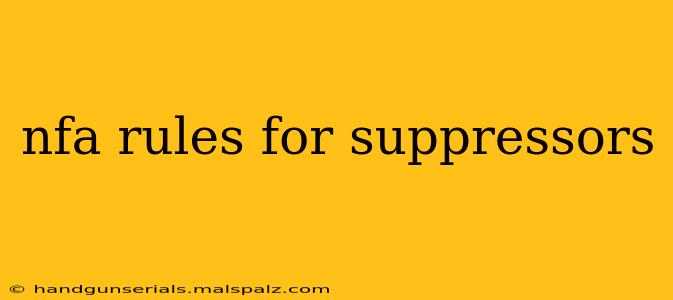Navigating the National Firearms Act (NFA) can be daunting, especially when it comes to suppressors (also known as silencers). This guide breaks down the key regulations surrounding suppressor ownership and use in the United States. Understanding these rules is crucial for responsible firearm ownership.
What is the NFA and Why Does it Regulate Suppressors?
The National Firearms Act of 1934 (NFA) is a United States federal law that regulates certain types of firearms and firearm accessories considered "dangerous and unusual." Suppressors fall under this category due to their potential to muffle the sound of gunfire, which could facilitate criminal activity. However, the vast majority of suppressor owners are law-abiding citizens who use them for hearing protection, hunting, and recreational shooting.
Key NFA Rules for Suppressors:
The core requirements for owning a suppressor boil down to these points:
1. Registration with the ATF:
- Serial Number: Each suppressor must have a serial number assigned by the manufacturer.
- Form 1 or Form 4: To legally own a suppressor, you must file either Form 1 (making your own suppressor) or Form 4 (purchasing a suppressor from a licensed dealer).
- Tax Stamp: A $200 tax stamp must accompany both Form 1 and Form 4 applications. This is a federal tax on the possession of NFA items.
- Background Check: A thorough background check is conducted by the Bureau of Alcohol, Tobacco, Firearms and Explosives (ATF) as part of the application process. This check adheres to the same standards as those for purchasing a handgun.
- Waiting Period: Expect a significant waiting period (often several months) for the ATF to process your application and issue the necessary tax stamp.
2. Transferring a Suppressor:
- ATF Approval Required: Transferring a suppressor requires ATF approval, regardless of whether it's between private citizens or through a licensed dealer.
- New Form 4: A new Form 4 application must be submitted for each transfer, along with a fresh $200 tax stamp and background check. This process mirrors the initial acquisition.
3. State and Local Laws:
- Varying Regulations: Remember that federal NFA regulations are complemented by state and local laws, which can vary significantly. Some states may have additional restrictions or outright bans on suppressors. Always check your state and local ordinances before purchasing or possessing a suppressor.
4. Proper Storage and Transportation:
- Locked Container: When not in use, the suppressor must be stored securely in a locked container.
- Transportation Laws: Specific transportation regulations apply. It's crucial to be aware of these laws and ensure you are complying with them while traveling with your suppressor.
Common Misconceptions about Suppressors:
- Complete Silence: Suppressors do not make firearms completely silent. They significantly reduce the sound, but a gunshot will still be audible.
- Illegal Use: The use of a suppressor in the commission of a crime is a serious offense, punishable by severe penalties.
Conclusion:
Owning a suppressor in the United States involves a complex legal process governed by the NFA. Thorough understanding of these regulations is critical for responsible and legal ownership. Always consult with legal counsel and your local ATF office to ensure compliance with all applicable federal, state, and local laws before acquiring a suppressor. This information should not be considered legal advice; consult legal professionals for authoritative guidance.

